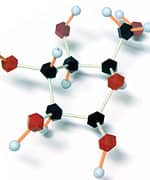- Science & Research
- Science News
- Newsletter
- 2014
- September 16

Newsletter
Newsletter
Activating AMPK In One Organ Slows Whole Body Aging
Activating AMPK in one organ could slow whole body aging |
|||
Tuesday, September 16, 2014. An article published online on September 4, 2014 in Cell Reports reveals the outcome of research conducted at the University of California, Los Angeles which found that activation of adenosine monophosphate-activated protein kinase (AMPK) in one organ decelerated the aging process elsewhere in the bodies of fruit flies. AMPK is a gene that is activated when cellular energy levels are low. The gene has also been found to be activated by the antidiabetic drug metformin. AMPK stimulates a process known as autophagy that enables cells to degrade and eliminate damaged components, which helps protect against aging. "We have shown that when we activate the gene in the intestine or the nervous system, we see the aging process is slowed beyond the organ system in which the gene is activated," commented senior author David Walker, who is an associate professor of integrative biology and physiology at UCLA. For their research, Dr Walker, along with lead author Matthew Ulgherait and colleagues, examined over 100,000 genes in Drosophila melanogaster, the fruit fly that has been the subject of numerous other experiments in the field of gerontology. The team found that increasing AMPK in the flies' intestines increased life span by 30% and lengthened the portion of their lives spent healthy. "A really interesting finding was when Matt activated AMPK in the nervous system, he saw evidence of increased levels of autophagy in not only the brain, but also in the intestine," Dr Walker reported. "And vice versa: activating AMPK in the intestine produced increased levels of autophagy in the brain—and perhaps elsewhere, too." "Matt moved beyond correlation and established causality," he added. "He showed that the activation of autophagy was both necessary to see the antiaging effects and sufficient; that he could bypass AMPK and directly target autophagy." "Instead of studying the diseases of aging—Parkinson's disease, Alzheimer's disease, cancer, stroke, cardiovascular disease, diabetes—one by one, we believe it may be possible to intervene in the aging process and delay the onset of many of these diseases," Dr Walker predicted. "We are not there yet, and it could, of course, take many years, but that is our goal and we think it is realistic." |
|||
| What's Hot | |||||||
| Aspirin, metformin share common mechanism | |||||||
A report by scientists from McMaster University, the University of Dundee and the University of Melbourne, published online on April 19, 2012 in the journal Science suggests a common mechanism for salicylate—aspirin's active compound—and the drug metformin in decreasing the risk of several diseases. "Salicylate, a plant product, has been in medicinal use since ancient times," Simon A. Hawley and colleagues write in their introduction to the article. "More recently, it has been replaced by synthetic derivatives such as aspirin and salsalate, both rapidly broken down to salicylate in vivo." The authors explain that salsalate or aspirin administered in high doses result in the activation by salicylate of adenosine monophosphate-activated protein kinase (AMPK), a regulator of cell growth and metabolism. AMPK is known to be activated by exercise as well as the antidiabetic drug metformin. "We're finding this old dog of aspirin already knows new tricks," commented co-principle investigator Dr Greg Steinberg, who is an associate professor of medicine in the Michael G. DeGroote School of Medicine at McMaster University and the Canada Research Chair in Metabolism and Obesity. "In the current paper we show that, in contrast to exercise or metformin which increase AMPK activity by altering the cells' energy balance, the effects of salicylate are totally reliant on a single Ser108 amino acid of the beta 1 subunit. "We show that salicylate increases fat burning and reduces liver fat in obese mice and that this does not occur in genetically modified mice lacking the beta1 subunit of AMPK," he noted. The fact that both metformin and aspirin activate AMPK suggests that their recently publicized benefits in reducing the risk of cancer could be due to a shared mechanism. However, only further studies can confirm the validity of this interesting hypothesis. |
|||||||
Life Extension Clinical Research Update Participate in a Clinical Study: Study Objective: To Qualify:
Your Involvement:
Register For This Study https://www.lifeextension.com/clinicalresearch/ClinicalTrials.htm |
||||||||||
Health Concern
|
||||||||||
| Latest Products | |||||
 |
Super Omega-3 EPA/DHA with Sesame Lignans & Olive Fruit Extract, 60 softgels Item #01483
|
||||
Omega-3 fatty acids, found in coldwater fish (and fish oil), perilla and flaxseed oils, are essential elements of a healthy diet. Omega-3 oils contain eicosapentaenoic acid (EPA) and docosahexaenoic acid (DHA), which are usually lacking in the typical Western diet, which is filled with foods containing high amounts of omega-6 fats. Life Extension's Super Omega-3 is a premium, scientifically-validated fish oil concentrate, derived from sustainable sources, that contains a proprietary, full-spectrum blend of synergistic nutrients to provide scientifically validated cardioprotective health benefits. |
|||||
 |
Pomegranate Extract Capsules, 30 vegetarian capsules Item #00956
|
||||
Few nutritional sources have gained as much scientific validation as pomegranate. Pomegranate fruit contains polyphenols, tannins, and anthocyanins—all beneficial antioxidants. Compounds known as punicalagins also found in pomegranate benefit arterial health by virtue of their ability to regulate healthy endothelial function. |
|||||
| Related Life Extension Magazine® Articles | |||
| The Drug Virtually Everyone Should Ask their Doctor About |
The CR Way™ to Great Glucose Control | ||
 |
 |
||
The latest news on aging, nutrition, and vitamins
Lab
Testing
How Life Extension lab testing works



